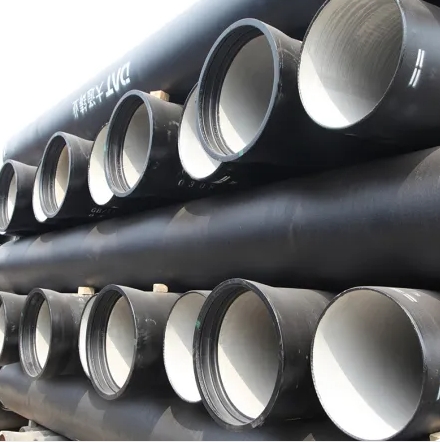What is ductile iron water pipe?
Introduction
Water is the elixir of life, and delivering it to our homes, businesses, and industries is a critical aspect of modern infrastructure. One key component of this extensive network is the ductile iron water pipe, a robust and reliable material that has been an integral part of water distribution systems for decades. In this article, we will explore the world of ductile iron water pipes, shedding light on their characteristics, benefits, and why they continue to play a crucial role in water distribution systems.

The Evolution of Ductile Iron Pipes
Ductile iron pipes, also known as ductile cast iron pipes, have a long history dating back to the mid-20th century. They are an improved version of traditional cast iron pipes, known for their durability but also their brittleness. Ductile iron pipes were developed to overcome the shortcomings of their predecessors while retaining their strength. This transformation was achieved through a process called ductile ironization, which involved adding small amounts of magnesium to the iron alloy, resulting in a more malleable and flexible material.
Characteristics of Ductile Iron Water Pipes
Ductile iron water pipes possess several characteristics that make them suitable for water distribution systems:
a. Strength: Ductile iron pipes are incredibly strong, capable of withstanding high pressures and loads. This strength ensures they can handle the demands of water distribution networks, even in areas with high traffic or challenging soil conditions.
b. Durability: These pipes have a long lifespan, often exceeding 100 years. They are resistant to corrosion and can withstand the test of time, making them a cost-effective choice for water infrastructure projects.
c. Flexibility: The ductility of ductile iron pipes allows them to flex and bend without breaking, making them suitable for areas prone to ground movement, such as earthquakes. This flexibility reduces the risk of catastrophic pipe failures.
d. Ease of Installation: Ductile iron pipes are relatively easy to install due to their manageable weight and compatibility with various jointing methods. This facilitates the construction and maintenance of water distribution systems.
e. Corrosion Resistance: Unlike their predecessors, ductile iron pipes are highly resistant to corrosion. The internal lining of these pipes often includes a cement mortar, which provides an additional layer of protection against corrosion, ensuring the quality and purity of the transported water.
Advantages of Ductile Iron Water Pipes
The widespread use of ductile iron water pipes in water distribution systems is attributed to several key advantages:
a. Longevity: Ductile iron pipes have a long lifespan, reducing the need for frequent replacements and associated maintenance costs. This longevity is vital for ensuring the reliable supply of clean water to communities.
b. Low Maintenance: The robust nature of ductile iron pipes means that they require minimal maintenance over their lifetime. This translates into cost savings for utility providers and, ultimately, for consumers.
c. High Flow Capacity: These pipes have a smooth internal surface, which promotes efficient water flow. Their high flow capacity is critical for maintaining water pressure and ensuring consistent supply, even in times of high demand.
d. Sustainability: Ductile iron pipes are a sustainable choice for water infrastructure projects. Their long service life and low maintenance requirements reduce the environmental impact of water distribution systems.
e. Resilience: The flexibility and durability of ductile iron pipes make them resilient to various environmental factors, including temperature fluctuations, ground movements, and seismic events.
Types of Ductile Iron Pipes
Ductile iron water pipes come in various types to cater to specific needs and applications within water distribution systems:
a. Pressure Pipes: These pipes are designed to handle the high pressure of water distribution. They are commonly used for transmitting potable water, wastewater, and industrial fluids.
b. Non-Pressure Pipes: Non-pressure ductile iron pipes are employed for gravity flow applications, such as stormwater drainage, sewage conveyance, and irrigation systems.
c. Trenchless Pipes: Trenchless ductile iron pipes are a special category designed for installation without open trenches. They are used in projects where minimizing disruption to the surrounding environment is essential.
d. Special Coatings: To enhance their corrosion resistance, ductile iron pipes can be equipped with special coatings. Some common coatings include zinc, epoxy, and polyurethane, further extending the pipes' lifespan and reliability.
Installation and Maintenance
The installation of ductile iron water pipes follows specific guidelines and procedures to ensure their longevity and reliability. Proper trench excavation, jointing methods, and backfilling are crucial aspects of the installation process. Additionally, routine inspection and maintenance are necessary to monitor the condition of the pipes and address any issues promptly. Regular cleaning, coating inspection, and corrosion protection measures are vital to maintaining the integrity of the pipes.
Conclusion
Ductile iron water pipes have played a pivotal role in the development and maintenance of water distribution systems worldwide. Their exceptional strength, durability, and flexibility have made them the go-to choice for ensuring the safe and efficient delivery of clean water to communities and industries. As the demand for reliable water infrastructure continues to grow, ductile iron pipes remain an essential component of modern society's lifeline, supporting public health and economic prosperity. Through constant innovation and adherence to high-quality standards, ductile iron pipes are likely to remain a fundamental part of our water supply systems for many decades to come. We are Ductile Iron Pipes and Fittings Manufacturers. If you need, please contact us.
Tags: Ductile iron pipe vs steel pipe ductile iron pipe advantages what is ductile iron pipe?
270
0
0

Comments
All Comments (0)